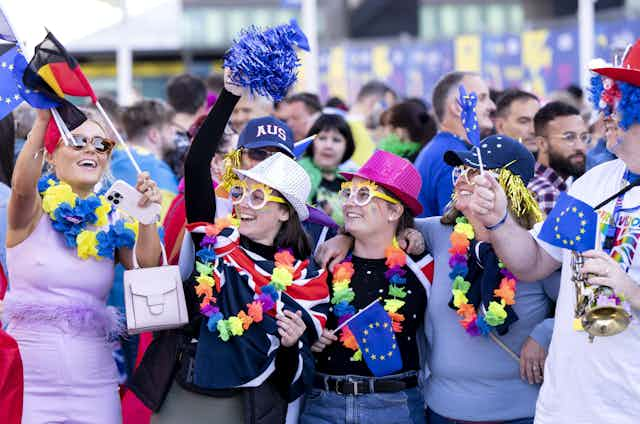With an aesthetic dependent on novelty and spectacle, and a structure that’s both disjointed and drawn-out, Eurovision – for some – cannot fail to fail. In its “failed seriousness” (the phrase writer Susan Sontag used to describe “camp”), the song contest has all the exaggerated expressiveness that audiences associate with kitsch. So, how could it possibly be cool?
I’m interested in viewing the show through the lens of cool theory (which identifies different kinds of cool and breaks those down into core qualities). “Coolness” itself is a slippery and controversial term that can mean almost opposing things.
For some, “cool” is simply what is fashionable. It can also be a rebellion against what is fashionable. Or an anti-social attitude in which nothing and no one else matters beyond your own stylish persona.
Indeed Sam Ryder – the UK’s near-win Eurovision act of 2022 whose high energy performance combined epic, earnest vocals with flowing natural locks, pearly teeth and a bejewelled one-piece – told the Guardian in 2022 that cool is “the enemy”.
The profile of Ryder claimed he had no interest in the “detached rock star” exterior. This refers to the sense of unwillingness of “cool” musicians to have their dignity compromised by other people’s rules – an unwillingness to be caught making an effort.
But Eurovision is all about effort. A publicised drama of rehearsals and heats, nervous waving and nail biting in the green room – the performers are just generally far too eager. Because whether it’s death metal or pared back electronica, being liked is what these musicians are here for.
On the other hand, it’s hard to imagine the uber-cool 1960s krautrock band Can giving two hoots what a jury in Brussels would make of their genre-defining understated rock. Nor the jazz men Miles Davis, Charlie Parker or Lester Young, who set the parameters of cool performance with their sharp, formal attire and refusal to acknowledge the audience.
What kind of ‘cool’ is Eurovision?
Although the performers of Eurovision aren’t detached, the audience can be. Sociologist Janna Michael’s 2015 study of European urban hipsters revealed that the point of cool is not what is liked, so much as how it is liked. This goes some way to explaining Eurovision’s appeal.
Since the 1980s, Eurovision has been presented (certainly in Britain) as something to enjoy in a specifically detached way, through irony. From 1973 to 2008, former commentator Terry Wogan’s flippant narration allowed the audience to collude in a knowing superiority over the event, finding its failed seriousness funny.
The cult following of Eurovision among those with a camp sensibility was further endorsed by the appointment of comedian Graham Norton as Wogan’s more obviously camp successor.

Do these fans love Eurovision because they enjoy the catharsis of the unabashed release of “bad taste”? Or because they enjoy feeling superior to those people (and nations) who genuinely engage with the drama of the competition? This is a side of cool’s ironic detachment that celebrates disdain for others.
However, many British fans now speak enthusiastically about the tolerance and openness of Eurovision. As host Rylan Clark said this year: “Everyone is welcome.” In recent years Eurovision has become more obviously and consciously open to gender diversity and aligned to LGBTQ+ tastes.
This was crystallised by bearded Austrian drag queen Conchita’s winning performance in 2014. The drag makeovers given to all three semi-final hosts this year confirmed the contest’s status as a space which endorses self-creation, individuality and tolerance – all aspects of the cool attitude.
Becoming mainstream
In the past, scholars of the theory of coolness have often focused too heavily on men and masculine, emotionally blank forms of “cool”, with composure and self-possession at their heart. Though this brand of cool is eloquently expressed in jazz, it is also visible in the consummate performer of drag.
Thanks to the popularity of shows such as RuPaul’s Drag Race, drag – once enjoyed purely in LGBTQ+ subcultures – is now mainstream entertainment. This is perhaps one reason Eurovision has suddenly become perceived as “cool” by some. But experiences of exclusion and marginalisation have historically been the conditions in which modern cool has been forged.
Read more: RuPaul’s Drag Race: our research shows how it helps destigmatise the LGBTQ+ community

The very fact that Eurovision has been viewed for decades as a cultural white elephant, a place of almost inconsequential melodrama, gives it the potential to be resurrected as cool.
Liking Eurovision was once an anti-mainstream position. This gave the show the potential to become “cool”, through both its exaggeration of qualities seen as undesirable by dominant social tastes, and its willingness to push the boundaries of convention, despite the detractors.
The concept of cool is complicated – and it is changing. Indeed, some recent studies have shown that perception of coolness is connected to activism and pro-social traits. Eurovision may seem like sparkly fluff, but perhaps now more than ever, it is also a vehicle for promoting greater acceptance of other ways of life. It’s all cool.

